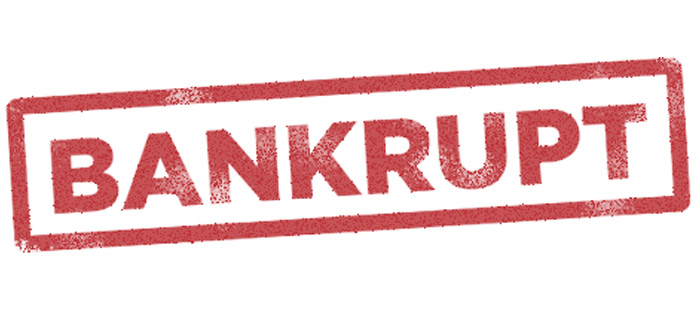The Colt gun company, which filed for Chapter 11 bankruptcy protection, has amassed a long history and a trove of famous and infamous gunslingers across the way. But in June this year Colt Defense, headquartered in West Hartford, Connecticut, found itself with more debt than it can handle. However, according to its bankruptcy filing, the company has $20 million in financing to continue operations during the bankruptcy proceedings. Eventually, Colt will only pay a portion of what it owes to each creditor.
Viewed as one of the fastest bankruptcies in grocery store history, the small grocery-store chain Haggen filed for Chapter 11 bankruptcy protection last week seeking to reorganize more than $55 million in debt. The Bellingham Herald reports that Chief Executive John Clougher said the reorganization will allow the Bellingham-based Haggen to continue to operate while enabling the grocer to re-align its operations. Creditors have committed up to $215 million to keep the company running while it sells stores.
The struggling grocer, which went from a family business to a West Coast power virtually overnight after buying 146 stores from Albertsons, released a statement saying it would focus on profitable core stores while in talks to sell many of the company’s remaining assets.
With Albertsons’ acquisition in February this year, Haggen was to expand from 18 stores with 16 pharmacies to 164 stores with 106 pharmacies, from 2,000 employees to more than 10,000 employees and from a Pacific Northwest company with locations in Oregon and Washington to a major regional grocery chain with locations in Washington, Oregon, California, Nevada and Arizona. In Bend, the two Albertson’s were converted to Haggen stores.
After the big acquisition in August, Haggen sued Albertsons for more than $1 billion in damages, alleging the supermarket giant engaged in systematic efforts to eliminate it as a viable competitor in five states. The new bankruptcy seems almost too convenient for a company that just bought 146 stores. Several Central Oregon vendors are owed money from doing business with Haggen.
Which leads us to perhaps the most famous bankruptcy deals, those of Donald J. Trump, currently a significant contender for the Republican presidential nomination. Trump filed four commercial bankruptcies in 18 years calling them routine corporate deals allowed by law and repeated by, “many, many others on top of the business world.”
But according to the Washington Post, missing from Trump’s retelling is that all four bankruptcies were high-profile embarrassments for his name-brand American empire.
To secure better deals or more time to pay off debts, Trump forfeited lucrative ownership stakes and allowed bankers, lawyers and bondholders to feast on his empire. In one deal involving hundreds of millions of dollars in debts he had personally guaranteed, he agreed to sell his airline and mega-yacht, and he allowed bankers to stipulate how much he could spend every month.
The real estate tycoon has for years portrayed the Chapter 11 bankruptcies of his glittering hotels and casinos as calculated, even shrewd maneuvers, and facts of life in the high-stakes worlds of mega-development and commercial finance.
“We’ll have the company. We’ll throw it into a chapter. We’ll negotiate with the banks. We’ll make a fantastic deal,” Trump told ABC in 2011. “You know, it’s like on The Apprentice. It’s not personal. It’s just business.”
Investor Alley published a 2015 Bankruptcy Watchlist that includes several oil and gas exploration companies: Transocean ($10.3 billion in debt), Halcón Resources Corporation ($3.5 billion in debt), Paragon Offshore ($1.7 billion debt load) and Chesapeake Energy ($1.7 billion debt).
It’s hard to relate to these kinds of debt loads but even considering their assets, a lot of creditors will be left with absolutely nothing. Leaving us to question creditors willingness to loan so much money and putting numerous vendors’ future in jeopardy.
Bankruptcy laws are aimed to help you, whether you wish to continue or shut down your business. So many times a company gets caught off guard by their wavering financial position and have no choice to go under or reorganize. However, to some, like Trump, the whole thing is just a complicated game with money to be made at the end of the deal.
Which type of bankruptcy can benefit you the most depends on your business structure and if you intend to stay in business. Chapter 7 is available to both individuals and businesses. Its purpose is to achieve a fair distribution to creditors of the debtor’s available non-exempt property. If debts outweigh the value of the assets, whatever is liquidated gets split up among creditors.
Chapter 13 is for individuals or sole proprietors. It is designed for someone with regular income whose debts do not exceed certain amounts. It is used to budget some of the debtor’s future earnings under a plan through which creditors are paid in full or in part.
Chapter 11 is primarily used by corporations. (Western Communications, owner of The Bend Bulletin, filed Chapter 11 in 2011).The purpose of Chapters 13 and 11 is to give the debtor a breather from creditors while the individual or company attempts to reorganize and come up with a better, more profitable way of doing business.
While helping the company in trouble to reorganize, the bankruptcy law does nothing to help its creditors who will be financially damaged by the unpaid debt. If you become a creditor, in cases where the debtor is trying to save the business and pay back creditors your best bet is to negotiate a resolution, hopefully one that is in your favor.
In order to not find your company in trouble over a bankruptcy situation, you should protect yourself from your customers you decide to give credit to by getting a deposit, collateral or a third-party guarantee. You can also use a security agreement and a Uniform Commercial Code 1 form to insure your receivables.
In order to not find your company in bankruptcy, like many local companies did during the recession, you should be able to read and understand your financial statements, know when you have a problem and be prepared and able to remedy the challenge. Trump has tried to make bankruptcy sound like part of doing business, but it’s not a fun business model and we can all take measures to avoid it.
Should the bankruptcy laws be expanded to limit the number of times people can be involved in this type of economic failure? Surely a pattern of overindulgence and excess should not be rewarded with the ability to repeated bankruptcies for economic gain?
Bankruptcy May Save Big Companies, But the Small Business Owner Can Be Destroyed
0
Share.





